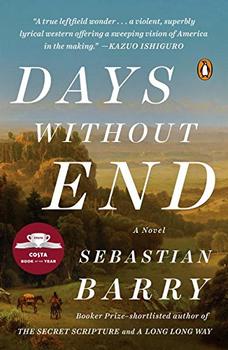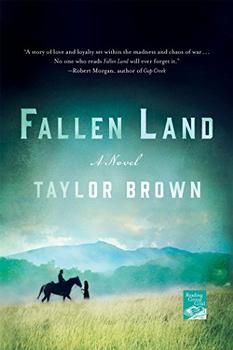Summary | Excerpt | Reviews | Beyond the book | Read-Alikes | Genres & Themes | Author Bio

A Novel of Murder, Loss, and Vengeance
by Paulette JilesReading Paulette Jiles' revenge western Chenneville, it's easy to remember she's a poet. She plays with language, painting her characters and scenery in vivid color. The story follows a former Union soldier named John Chenneville as he searches for revenge and his memories, narrated in Jiles' lush prose.
He wakes in a Virginia army hospital in 1865, suffering from a head wound and amnesia. After months recovering, John is finally released home to Missouri. But it's hard to remember who he was before. Fragments of feeling return first, "unbidden and intensely real."
"Ghosts of a memory, impressions. His brain had gone back to the basics, remembering and re-remembering. This is truly what we are to each other: a shape, a feeling, phantoms of love or threat of laughter, those who are lucid and speak in a strange old archaic French and smell of well-worn wool, of tobacco, of apples and wine."
When he hears of his sister's murder by a man named Dodd, John becomes someone new, grieving and seeking retribution. His quest leads to Texas, and he expects it will not end well no matter the outcome. But his forgotten character soon reemerges. Hardened and steadfast, introspective and considerate. John's warmth shines when he hears women laughing, or when he cares for starving puppies and their mother.
Chenneville reminded me why reading is true magic. Jiles is a very observational writer; the flicker of an eyelid and gentle grip of the wrist are two of the many minute details she uses to display emotion and build a balanced scene. She has that rare gift of putting the reader directly in the character's shoes, and this is a character study of the highest order. When John remembers something new, you feel the elation alongside him. He feels ready to walk out of the page, or at least into a movie. This is a novel that would work beautifully as a screen adaptation.
Another of Jiles' talents is crafting characters in only a few pages of storytime. In this journey of vengeance, John crosses paths with transitory characters who often linger in rippling effects. Like a web, everything is connected. Though most of the narrative lives in John's mind, the few third-person point-of-view transitions are seamless.
The writing is restrained and never self-indulgent — exploring characters John directly encounters and remembers, such as Aubrey Robertson, the chess-loving English telegrapher who shelters him during a blizzard. Through Aubrey, John first hears of the deft skill of another telegrapher: Victoria Reavis, known as Belle. Belle captures his attention with her distinctive Morse code and sign-off. It feels deeply intentional that John learns of Belle and Dodd secondhand through others. This allows him to imagine them freely, creating expectations that guide him forward.
Chenneville's tone feels appropriate for its setting, the recent Civil War haunting all. The people and land are unforgiving; no one has time for frivolity or wishful thinking. Though chased by a stubborn marshall, John is hell-bent on avenging his sister, and he cannot be steered from this arduous task. He rides until he falls ill with fever and can only slowly recall pieces of his life.
But as his wounded mind heals and he finds his life tangled with Belle's, he begins to see a better purpose: "She seemed to him a lamp in a dark place and a saving grace from the cesspit of human waste from which he had just come. He felt an uncoiling inside himself, an unbending perhaps."
It's John's true nature that saves him more than anything. Though he fails often, he handles trials with resolute grace. He cares about all living things and never stoops to Dodd's level in an effort to win. This kindness of character is John's greatest advantage. In every situation, he chooses the decent thing, and in the end this makes all the difference.
Chenneville seems to be about how our minds shape our reality — whether they're our ideas of a person or our true memories. Who are we without them? Is a sense of duty more important than innate humanity — the ability to feel, to love, to get angry? Without it, we're hollow shells. As one man says of Dodd's kind: "They are not human...We always want to give them human motivations but they don't have any." Chenneville hearkens back to westerns long past, Riders of the Purple Sage in particular. But with Jiles' thoughtful care, it truly is one of a kind. Give this masterful novel a shot. It is highly recommended.
![]() This review was originally published in The BookBrowse Review in October 2023, and has been updated for the
October 2024 edition.
Click here to go to this issue.
This review was originally published in The BookBrowse Review in October 2023, and has been updated for the
October 2024 edition.
Click here to go to this issue.

If you liked Chenneville, try these:

by Sebastian Barry
Published 2017
Moving from the plains of Wyoming to Tennessee, Sebastian Barry's latest work is a masterpiece of atmosphere and language. An intensely poignant story of two men and the makeshift family they create with a young Sioux girl, Winona, Days Without End is a fresh and haunting portrait of the most fateful years in American history and is a novel never ...

by Taylor Brown
Published 2017
Searching for a home in a ravaged landscape, two star-crossed lovers flee a ruthless band of bounty hunters, from the Blue Ridge Mountains of North Carolina to Sherman's March through Georgia in the final years of the Civil War.
Nearly all men can stand adversity, but if you want to test a man's character, give him power.
Click Here to find out who said this, as well as discovering other famous literary quotes!
Your guide toexceptional books
BookBrowse seeks out and recommends the best in contemporary fiction and nonfiction—books that not only engage and entertain but also deepen our understanding of ourselves and the world around us.